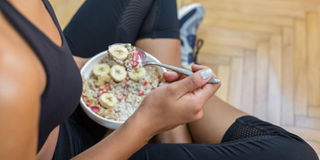Nutrition is important for exercise

What you need to know:
When it comes to eating food to fuel your exercise performance, it is not as simple as choosing vegetables over doughnuts. You need to eat the right types of food at the right times of the day.
You have heard that abs are made in the kitchen which underscores the importance of proper nutrition in trying to get fit. You need to feed your body well for it to be able to do the things you want it to do. Remmy Semwaka, a fitness trainer says he encourages his clients to think of their bodies as cars.
“Just like cars people’s bodies work at different rates. Some are fast others are slow but they all need the right type and amount of fuel to function,” Semwaka relates. The three basic nutrients a body needs to function, are protein, carbohydrates, and fat. So when starting a workout regimen, it is advised to get atleast at 10 to 35 per cent of your total calories, with carbohydrates accounting for 40 to 60 per cent of total calories. Fat, which should not be limited as it is vitally important for absorbing vitamins and keeping cells working properly, should consist of 20 to 30 per cent of your total daily calories.
The right balance of carbohydrates, protein, and other nutrients can help fuel your exercise routine. In addition to eating the right types of food, you also need to eat at the right times of the day. A healthy meal can help replenish your blood sugar, which your body needs to power your muscles and brain.Eating a healthy breakfast is especially important for people who exercise regularly.
A healthy breakfast should have a high fibre, protein and carbohydrate content. “Try whole-grain cereals that are high in fibre, milk, yogurt, eggs, peanut butter and carbohydrates because they are your body’s main source of energy,” Semwaka says.
It is also important to have enough fruits and vegetables because they are rich sources of natural fibre, vitamins, minerals, and other compounds. Aim to fill half your plate with fruits and vegetables of various colours at every meal which will help you enjoy the full range of vitamins, minerals, and antioxidants.
Fat
Although it is often undervalued, the body also needs fat because it is a primary fuel for aerobic exercise. The body gets essential fatty acids from dietary fats.
In addition to fuelling the body, according to nutritionist Mary Jackie Nanyonjo, fat also helps in protecting organs, making of cell membranes and making important hormones such as testosterone among others.
“When building your meal plan, be sure to incorporate enough good fats in your diet.
Play around with the amount of fat in your diet and pay attention to how you feel with more fat or less fat. Find what works for you,” she advises.
You can fuel up with fats from sources such as steamed or broiled fish, nuts, seeds, avocados, flax oil, hemp oil, olive oil, and other poly and mono unsaturated and essential fatty acid oils.
Other foods
Bananas
Eating a banana can help replenish these minerals while providing natural sugars to fuel your workout. For added protein, enjoy your banana with a serving of peanut butter.
Berries, grapes, and oranges
These fruits are all full of vitamins, minerals, and water. They’re easy on your intestines, give you a quick boost of energy, and help you stay hydrated. Consider pairing them with a serving of yogurt for protein.
Nuts
Nuts are a great source of heart-healthy fats and also provide protein and essential nutrients. They can give you a source of sustained energy for your workout.
Pair them with fresh or dried fruit for a healthy dose of carbohydrates. However, test these options to see how they settle.
Nut butter
Many grocery stores carry variety brands of peanut butter that do not require refrigeration and can be easily stored in a gym bag. For a tasty protein-carbohydrate combo, you can spread peanut butter on your bread.




